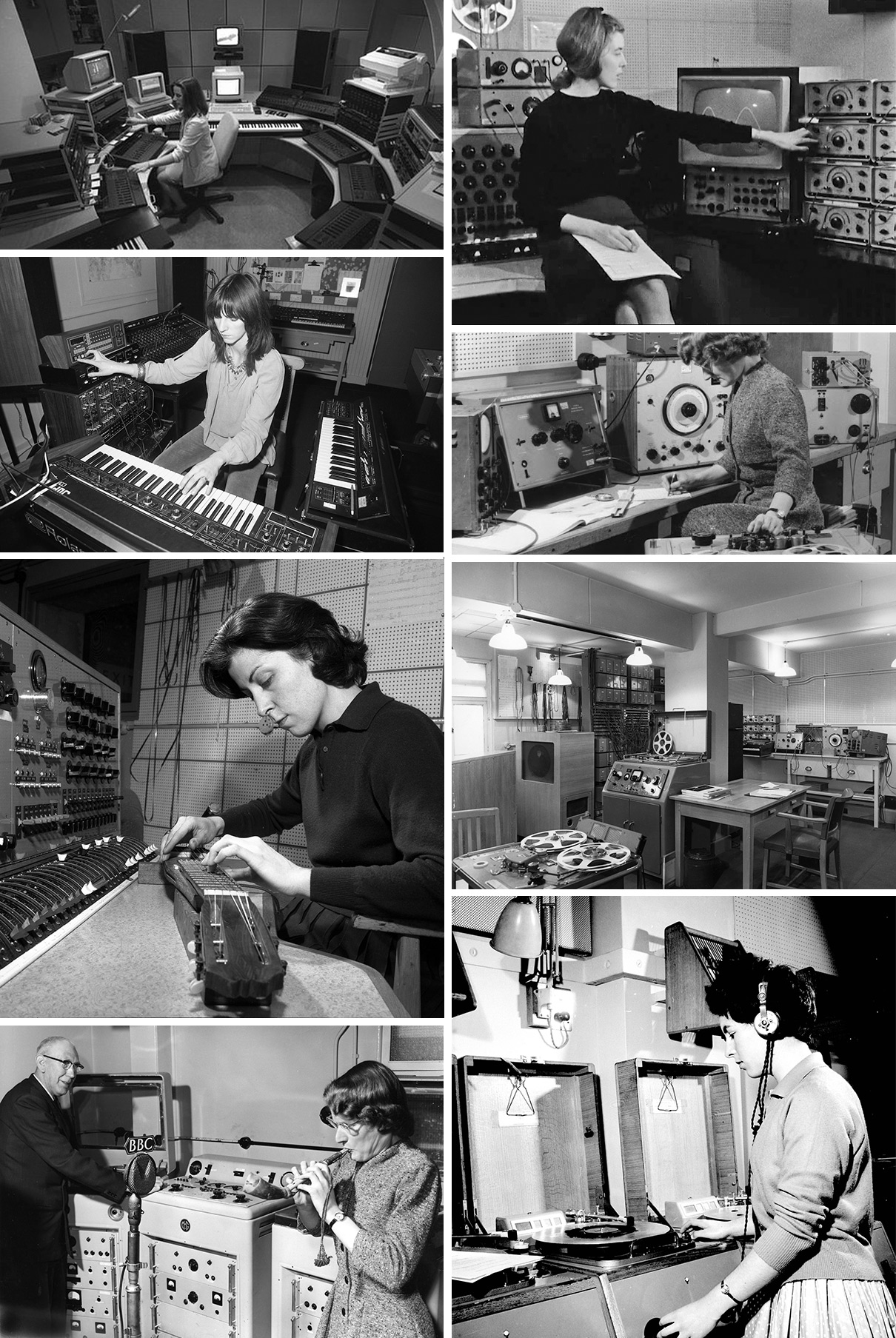«Die BBC Dokumentation «Alchemists Of Sound» zeigt einen Einblick in den «BBC Radiophonic Workshop» welcher 1958 gegründet wurde und zu den wichtigsten elektronischen Musikstudios in Großbritannien gehörte. Hier wurde an neuen, innovativen Sounds getüftelt welche man zuvor noch nie so gehört hat. «Doing strange things with sounds» war das Credo der Musique concrète jener Zeit. Eine der berühmtesten Arbeiten aus den Radiophonic Workshop Labors ist wahrscheinlich der Filmtitel zu «Dr. Who», nebst diversen Musik und Sound-Effekten für das BBC Programm.
Der Workshop ist aber auch bekannt für seine Pionierarbeit die es Komponisten ermöglichte zu experimentieren und neue Sounds zu generieren, darunter einige Frauen wie Daphne Oram und Delia Derbyshire (eine Gleichberechtigung die ich hier gerne erwähne, in Anbetracht der ersten Jahre elektronischer Musik!).
1998 wurde der Radiophonic Workshop aufgelöst und von Serienproduktion elektronischer Komponenten, Synthesizern und Computern abgelöst. In einer profitorientierten Gesellschaft blieb auch in der BBC kein Platz mehr für Experimente und Avantgarde, die sich nicht in Pfund rechnen lässt.
 v.l.n.r.
Elizabeth Parker, Delia Derbyshire, Elizabeth Parker, Daphne Oram, Maddalena Fagandini, Studio, Daphne Oram, Diane Muir-Jones.
v.l.n.r.
Elizabeth Parker, Delia Derbyshire, Elizabeth Parker, Daphne Oram, Maddalena Fagandini, Studio, Daphne Oram, Diane Muir-Jones.
Photos: bbc.co.uk/music/articles/e71ca197-4808-4132-b1cc-0078d8066fee
«A woman works hard at a couple of record decks, creates a few loops. Later her music is played to millions of TV and radio listeners. The dream of a future superstar DJ? No, this woman is a past figure and the music isn’t dance but sounds for BBC programmes made by the members of the Radiophonic Workshop.
When the BBC created the Radiophonic Workshop in 1958, its job was to create “special sound” i.e. sound effects or incidental music for BBC radio and TV productions. The prime movers in persuading the BBC to set up its own sound unit in the 1950s were Desmond Briscoe and Daphne Oram who were both studio managers for the BBC as well as musicians. They weren’t interested in making ordinary music for programmes, they were interested in the possibilities tape manipulation and electronic sound offered. In essence the early products of the workshop were close to musique concrete (translation: music concrete) where any sound could be taken, e.g. the sound made by a key scraped down piano wire, and then manipulated in many ways, by adding echo, passing through filters, playing at a different speed or backwards, splicing with another sound. The original sounds could be made into something quite different, in the key’s case the sound of the TARDIS taking off. The Radiophonic Workshop’s compositions provided an atmosphere even a skilled actor reading a script couldn’t.»
Read the full article by Michelle Drury on: thefword.org.uk/2012/10/radiophonic_workshop
The Alchemists of Sound 1 The Alchemists of Sound 2 The Alchemists of Sound 3 The Alchemists of Sound 4 The Alchemists of Sound 5 The Alchemists of Sound 6
2012 erhielt der «BBC Radiophonic Workshops» als Teil von thespace.org, einer neuen digitalen Kunst- und Mediendienstleistung der BBC und dem Arts Council, ein Revival. Diesmal nicht mit voller Ausrüstung technischer Gerätschaften, sondern als virtuelle Institution. Ein Forum das sich der Diskussion rund um die Herausforderungen der Schaffung neuer Sounds widmet, in einer Welt, die von innovativer Musik-Technologie und deren Output übersättigt scheint.» – http://thespace.org
Der Workshop ist aber auch bekannt für seine Pionierarbeit die es Komponisten ermöglichte zu experimentieren und neue Sounds zu generieren, darunter einige Frauen wie Daphne Oram und Delia Derbyshire (eine Gleichberechtigung die ich hier gerne erwähne, in Anbetracht der ersten Jahre elektronischer Musik!).
1998 wurde der Radiophonic Workshop aufgelöst und von Serienproduktion elektronischer Komponenten, Synthesizern und Computern abgelöst. In einer profitorientierten Gesellschaft blieb auch in der BBC kein Platz mehr für Experimente und Avantgarde, die sich nicht in Pfund rechnen lässt.
 v.l.n.r.
Elizabeth Parker, Delia Derbyshire, Elizabeth Parker, Daphne Oram, Maddalena Fagandini, Studio, Daphne Oram, Diane Muir-Jones.
v.l.n.r.
Elizabeth Parker, Delia Derbyshire, Elizabeth Parker, Daphne Oram, Maddalena Fagandini, Studio, Daphne Oram, Diane Muir-Jones. Photos: bbc.co.uk/music/articles/e71ca197-4808-4132-b1cc-0078d8066fee
Do women dream of electric sheep?
«A woman works hard at a couple of record decks, creates a few loops. Later her music is played to millions of TV and radio listeners. The dream of a future superstar DJ? No, this woman is a past figure and the music isn’t dance but sounds for BBC programmes made by the members of the Radiophonic Workshop.
When the BBC created the Radiophonic Workshop in 1958, its job was to create “special sound” i.e. sound effects or incidental music for BBC radio and TV productions. The prime movers in persuading the BBC to set up its own sound unit in the 1950s were Desmond Briscoe and Daphne Oram who were both studio managers for the BBC as well as musicians. They weren’t interested in making ordinary music for programmes, they were interested in the possibilities tape manipulation and electronic sound offered. In essence the early products of the workshop were close to musique concrete (translation: music concrete) where any sound could be taken, e.g. the sound made by a key scraped down piano wire, and then manipulated in many ways, by adding echo, passing through filters, playing at a different speed or backwards, splicing with another sound. The original sounds could be made into something quite different, in the key’s case the sound of the TARDIS taking off. The Radiophonic Workshop’s compositions provided an atmosphere even a skilled actor reading a script couldn’t.»
Read the full article by Michelle Drury on: thefword.org.uk/2012/10/radiophonic_workshop
The Alchemists of Sound 1 The Alchemists of Sound 2 The Alchemists of Sound 3 The Alchemists of Sound 4 The Alchemists of Sound 5 The Alchemists of Sound 6
2012 erhielt der «BBC Radiophonic Workshops» als Teil von thespace.org, einer neuen digitalen Kunst- und Mediendienstleistung der BBC und dem Arts Council, ein Revival. Diesmal nicht mit voller Ausrüstung technischer Gerätschaften, sondern als virtuelle Institution. Ein Forum das sich der Diskussion rund um die Herausforderungen der Schaffung neuer Sounds widmet, in einer Welt, die von innovativer Musik-Technologie und deren Output übersättigt scheint.» – http://thespace.org